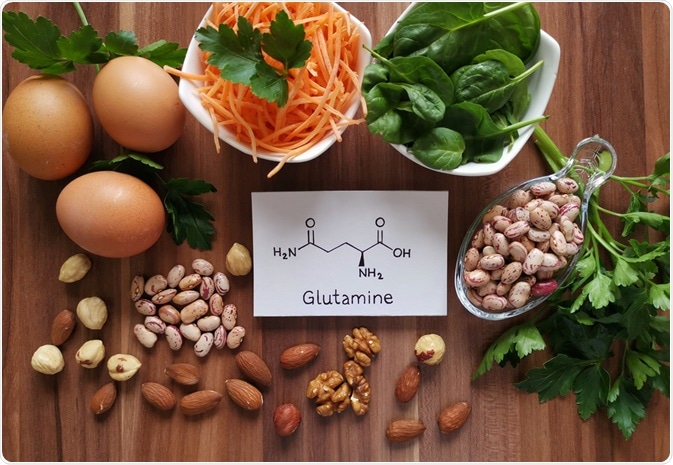Glutamine is one of the twenty amino acids, the individual building blocks that join together to make up proteins in the body.
 Image Credit: Danijela Maksimovic / Shutterstock.com
Image Credit: Danijela Maksimovic / Shutterstock.com
When a gene is expressed, three consecutive base pairs code for a particular amino acid. Through the connection of these amino acids, a polypeptide chain is made that eventually forms a protein. As one of these amino acids, glutamine is coded for by the base pairs CAA and CAG (where C stands for cytosine, A for adenine and G for guanine).
Glutamine is the most abundant free amino acid found in human blood, at a concentration of around 500-900 µmol/l. It is considered a conditionally essential amino acid. Essential amino acids are those that cannot be produced by the body and must therefore be consumed in the diet. A conditionally essential amino acid is one that may stop being produced by the body in specific disease conditions such as prematurity or severe catabolic distress.
Glutamine plays an important role in maintaining the balance of the body’s acid-base ratio. This amino acid is used to remove excess ammonia, a toxic waste product of deamination reactions. Glutamine enables toxic ammonia to be removed by the kidneys and connected to acids before it is excreted. Glutamine is also required for the production of other substances in the body such as glucose or other amino acids.
Glutamine is made in the muscles and is then distributed to various organs in the body via the bloodstream. Usually, the body makes a sufficient amount of glutamine required for regular bodily functions, but certain conditions such as injury, surgery, persistent stress or infection can lower glutamine levels. When the body requires more glutamine than it produces naturally, a glutamine supplement may be prescribed.
Wound healing and recovery
When the body is subjected to extreme stress due to surgery, injury or infection, for example, the hormone cortisol is released into the blood. This increased cortisol level can reduce the amount of glutamine stored in the body. Research has shown that supplemental glutamine can help lower the death rate among people with critical illness or trauma. It has also been shown to strengthen the immune system and reduce infection, particularly infection that follows a surgical procedure.
Inflammatory bowel disease
Glutamine plays an important role in protecting gastrointestinal mucosa and researchers have suggested that people with inflammatory bowel disease may be deficient in glutamine. However, two studies into the effects of glutamine supplementation in Chron’s disease did not show any clinical benefits associated with the supplements.
Cancer
People who are suffering from cancer often have low levels of glutamine and some experts suggest adding glutamine to chemotherapy or radiotherapy regimens for some individuals. Some studies have shown that glutamine helps to reduce the diarrhea and inflammation in the mouth (stomatitis) that can occur as a result of chemotherapy.
HIV/AIDS
People with HIV or AIDS often suffer from muscle wasting and weight loss. Some studies have found that supplementation with glutamine can help the intestines to absorb nutrients, leading to improved nutrition and weight gain in these individuals.
Bone marrow transplant
The intravenous administration of glutamine and nutrition after a bone marrow transplant has been shown to accelerate recovery and reduce infection more than the administration of nutrition alone. However, not all patients benefit from glutamine administration after a bone marrow transplant.
Endurance training
Training for high endurance events such as a marathon can lower the level of glutamine in the body and it is common for athletes to develop a cold after such an event. Some researchers believe this is due to the effects glutamine has on the immune system and one study has shown that glutamine reduced infections among athletes after they had taken part in high-intensity events. The benefit is not seen in cases of moderate-intensity events.
References
Further Reading
Last Updated: Aug 24, 2023